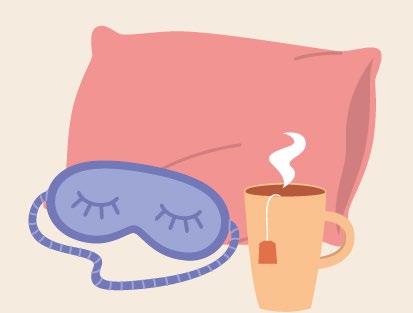
6 minute read
Be Kind to Your Mind
from BSA Today Issue 17
by bsatoday
Article | Caitlin Wood, Marketing Assistant at Blue Stream Academy
It’s no secret that health and care professionals are experiencing high levels of work-related stress. Unfortunately, people are feeling the effects in all sectors, whether it’s in the form of staff shortages, lack of support, or poorer mental health.
The Care Quality Commission’s ‘State of Care’ assessment for 2021/22 reports that only 43% of NHS staff felt able to meet all the conflicting demands of their work, with urgent care professionals continuing to report high levels of stress. Meanwhile, care homes facing nurse shortages are unable to admit new residents.
Amid the current disarray, what can health and care professionals do to cope with stress at work and try to prevent burnout? A recent review of interventions aimed at preventing occupational stress found that using mindfulness and mental and physical relaxation techniques in response to trying issues at work have “diverted attention away from unpleasant stressful thoughts and feelings and have built resilience”.
Amid the current disarray, what can health and care professionals do to cope with stress at work and try to prevent burnout? A recent review of interventions aimed at preventing occupational stress found that using mindfulness and mental and physical relaxation techniques in response to trying issues at work have “diverted attention away from unpleasant stressful thoughts and feelings and have built resilience”.
Fitting calming techniques into an already demanding schedule might seem stressful in itself, but these practices don’t have to take long. We’re here to help break down some of the tools you can use to take the time to be kind to your mind.
Let’s get to it.
Focus on Your Breathing
If you find yourself feeling overwhelmed, taking just 1 minute to focus on your breathing can calm the anxiety and regulate your blood flow and energy levels.
Simple breathing exercises can be hugely effective if you can incorporate them into your daily routine.
Check out this breathing exercise recommended by the NHS:
Stay standing up, sit in a chair that supports your back, or lie on the floor if this is more comfortable.
If you choose to lie down, rest your arms so they are away from your sides, with your palms up. If you’re sitting, rest your arms on the arms of the chair.
Inhale through your nose, and exhale through your mouth. Let your breath flow as deep down into your belly as is comfortable.
Breathe in gently and smoothly, counting steadily from 1 to 5.
Then let your breath flow out gently, counting from 1 to 5 again.
During periods of stress, your body can go into ‘fight or flight’ mode, which can increase your heartbeat and cause shallow breathing.
According to an article on the Calmer blog, breathing exercises like this one can counteract this reaction by releasing tension from the abdomen, slowing down your heart rate and bringing you into a state of mindfulness.

Practise Mindfulness
Mindfulness is “the basic ability to be fully present, and not overly reactive or overwhelmed by what’s going on around us”, and it’s often used as a tool for alleviating stress.
There are many ways of practising mindfulness, including meditation, being aware of your breath, and journalling. One technique that’s relatively easy to incorporate into the working day is to bring presence to every moment.
When you’re present at work, it’s easier to manage your mental and emotional state, take in your surroundings, and prevent your mind from wandering to negative thoughts and feelings.
A tool that can help with being present is STOP, which stands for: Stop, Take a breath, Observe, Proceed.
This is also known as the ‘doorknob practice’, because you can do it in the few seconds it takes to turn the handle when you enter a room.
Dr Mark Bertin, explaining three simple mindfulness techniques, says that the doorknob practice helps health and care professionals to reach a clear understanding of what needs to be done: taking a moment to stop, check in with yourself and observe what’s going on around you gives you the space to choose how to proceed with your next task.
Setting a clear intention in this way helps you to stay centred and focused.
Time to Rest
Adults need at least 7 hours of sleep a night, but a recent YouGov survey has revealed that 35% of us in the UK are lucky if we get 6 hours a night.
Rest is a fundamental part of managing stress and preventing burnout. When you’re fatigued, your brain becomes less functional; working for too long without rest reduces your concentration and emotional capacity, and can severely affect your mental health.
Developing a healthy sleep routine can be tough, especially when you’re working shifts or unsociable hours. The key is to create an adaptable schedule and get into some habits that will tell your body when it’s time to wind down.
Mayo Clinic recommends six key steps for making sure you get the rest you need.

1. Create a Schedule
Go to bed and get up at the same times every day. If you work shifts, try to do this over your shift cycles. Being consistent with this will reinforce your body’s sleep-wake cycle.
2. Pay Attention to What You Eat and Drink
Going to bed hungry – or straight after eating – is bound to keep you awake. Try to eat at least 2 hours before going to bed and avoid caffeine at least six hours before going to bed. The stimulating effects of these can heavily interfere with your sleep.
3. Make a Restful Environment
Being exposed to light can make it hard to fall asleep. Avoid blue light from devices and consider using black-out curtains or a sleep mask to create a dark environment. You could also use earplugs to block out noise.
4. Limit Naps
It might be tempting to nap on your break or straight after finishing work, but this can affect your overall sleep schedule.
5. Avoid Being Active Too Close to Bedtime
Doing physical activity during the day can help lower your stress levels and help tire you out, but being active too close to bedtime can make you feel more awake and discourage your body from resting.
6. Manage Your Worries
Journalling before you go to bed is a great way to quieten your mind before you go to sleep. You could write a to-do list, describe how your day has been or write down what you want to work on tomorrow. Putting your thoughts onto paper helps to clear your head so worries don’t keep you awake.

There you have it – some simple ways to be kind to your mind.
By incorporating these self-care practices into your day, you’ll be more able to take care of others as well as looking after yourself.
Remember, though, that managing stress is an ongoing process. The daily practices in this article can help, but it’s always important to ask for more support if you need it.








